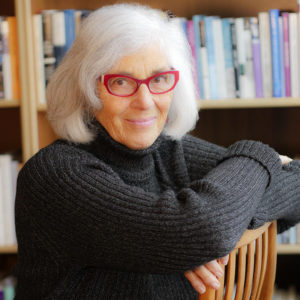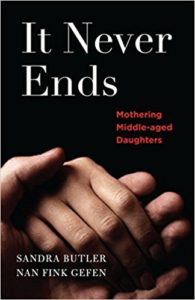Guest Post: A Silent Rebuke by Sandra Butler, co-author with Nan Gefen, It Never Ends: Mothering Middle-Aged Daughters
 Whenever my mother came to visit during the early years of my own mothering, I allowed my two young daughters to make messes. I encouraged them to express both their disagreements and their often disagreeable thoughts. Raising daughters who knew how they felt and had the confidence to speak up for what they thought was right and fair was a value I held, one emerging from my own longing and inability as a child to express my feelings and, as my grandmother would have put it, “stick up for myself.” My mother’s intention was to raise children who were well behaved and successful. Perhaps that was her way of communicating to her immigrant mother that she was living the American dream of white upwardly mobile motherhood of the l940’s and 50’s. She had a well scrubbed carefully furnished house. Obedient children. Her own car. All markers of American success.
Whenever my mother came to visit during the early years of my own mothering, I allowed my two young daughters to make messes. I encouraged them to express both their disagreements and their often disagreeable thoughts. Raising daughters who knew how they felt and had the confidence to speak up for what they thought was right and fair was a value I held, one emerging from my own longing and inability as a child to express my feelings and, as my grandmother would have put it, “stick up for myself.” My mother’s intention was to raise children who were well behaved and successful. Perhaps that was her way of communicating to her immigrant mother that she was living the American dream of white upwardly mobile motherhood of the l940’s and 50’s. She had a well scrubbed carefully furnished house. Obedient children. Her own car. All markers of American success.
Now I understand that much of my own behavior in those long ago years were designed to show my mother how she should have mothered me, even though I didn’t know it then. Unlike her rule-bound and orderly expectations, I was playful and free with my daughters. I wanted her to witness how we were together so she would recognize what engaged and generous mothering should look like.
I never wondered how my mother might have felt witnessing what must have seemed to her like outlandish behavior. What did she think as she watched her granddaughter eat only the creamy middles from a bag of Oreos, leaving the chocolate wafers in a crumbled pile on the kitchen table? Or carefully explaining why a sleepover on a school night was a reasonable request. Or having a melt-down and screaming how much she hated me and would forever and ever. Did she witness my warm and respectful responses and feel judged in her mothering? Confused by my behavior? She never said. Perhaps she was simply trying to be respectful and not interfere. Did she sense my rejection of her formal ways of parenting or did she criticize herself for mothering in the disciplined way she thought would produce a successful daughter?
During the last year of my mother’s life, I loved her with endless patience and willingness to put her needs before my own. I filled up the small refrigerator in her unit at the assisted living facility with small curd cottage cheese, Swedish rye bread, Tasters Choice instant coffee, prune juice and packets of Equal so she wouldn’t have to go into the dining room. Sitting with the other residents, she would have to pretend she could hear the conversation around her although she had never been able to adjust to wearing her hearing aids. She would smile vacantly, hurry through her meal, push her walker down the long hall and relievedly enter the quiet of her studio unit where she no longer had to strain to keep up and try to engage.
Instead, I became her company. I took her to lunch, to the exhibits at the nearby museum; even though she had to navigate the public indignity of a wheelchair when walking became too difficult. I washed and curled her hair after every salon in the vicinity had been tried and vanquished because when she looked into the mirror, her face still remained deeply lined, even through it was now framed by expertly curled hair. But when I got into the shower behind her to hold her steady and give her a shampoo, much more gently than those she used to give me decades before, then carefully lower her on to a chair facing the mirror so I could blow dry her hair, she felt beautiful. I was the daughter any mother would have wanted. I was again showing her how to love.
When my mother was very old and I was well past middle-age, the age my daughters are now, I understood more about how the choices my daughters have made reflect what they needed and missed as children. For my youngest, order, stability, and consistency frame her life. Tuesday is shaped much like Wednesday. Much like my childhood when I knew what we would have for dinner based on the day of the week. The unchanging nature of our life felt stifling, and I promised myself I would be a daring adult and raise my children to value the importance of involvement in the world beyond family. But she wanted sameness, needed to know what to expect when she came home from school and not have to look on the kitchen table for whatever hasty note might be waiting there. She has created a life that holds her steady, so she can venture out and return to a sense of order and security.
My eldest daughter defines the greatest success of her life as her marriage. For her, a life long partnership, a commitment to the exacting discipline of loving over decades is what provides the framework out of which everything else happens. No exuberant love affairs for her. No walking away when things felt too disappointing. No road trips and adventures. She and my son-in-law are entering their third decade of partnership, and I understand the choice that underlies her decision. I wanted to give my daughters what I never had. They wanted what they didn’t get. I gave my mother what I needed from her. Each choice, its own communication, its own rebuke, its own silent plea.
 Sandra Butler is the author of Conspiracy of Silence: The Trauma of Incest. Her second book, Cancer in Two Voices, co-authored with Barbara Rosenblum, was the winner of the 1991 Lambda Literary Award. She is also the co-producer of the award-winning documentaries Cancer in Two Voices and Ruthie and Connie: Every Room in the House. She has two middle-aged daughters and a rich community of women friends. Her latest work, It Never Ends: Mothering Middle-Aged Daughters co-authored with Nan Fink Gefen (out Oct. 10), provides readers with strategies and techniques they can adopt to balance their own aging alongside that of their daughters.
Sandra Butler is the author of Conspiracy of Silence: The Trauma of Incest. Her second book, Cancer in Two Voices, co-authored with Barbara Rosenblum, was the winner of the 1991 Lambda Literary Award. She is also the co-producer of the award-winning documentaries Cancer in Two Voices and Ruthie and Connie: Every Room in the House. She has two middle-aged daughters and a rich community of women friends. Her latest work, It Never Ends: Mothering Middle-Aged Daughters co-authored with Nan Fink Gefen (out Oct. 10), provides readers with strategies and techniques they can adopt to balance their own aging alongside that of their daughters.
















One Response to “Guest Post: A Silent Rebuke by Sandra Butler, co-author with Nan Gefen, It Never Ends: Mothering Middle-Aged Daughters”
This is so very true. I instinctively knew this but can see it clearer now! I look at my own mother and my now 27 year old daughter and see the pattern. Do you think the same can be said of fathers and sons?
By Tracey on Sep 12, 2017